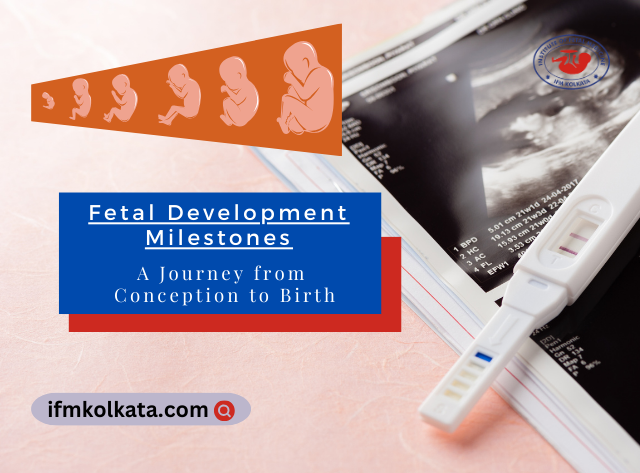The journey of fetal development is nothing short of a miracle. From the moment of conception to the day of birth, an intricate and awe-inspiring process unfolds, shaping a tiny cluster of cells into a fully-formed baby. Understanding these milestones is not only fascinating but also crucial for expectant parents and healthcare professionals. We offer a comprehensive range of services, including Invasives, USG in Pregnancy, Non-Invasives, and Blood Tests, all aimed at ensuring the proper fetal development of your precious baby.
Conception: The Starting Point
Fetal development begins at the moment of conception when a sperm cell successfully fertilizes an egg. This magical union creates a single-cell zygote, packed with genetic material from both parents. This tiny zygote marks the very inception of your baby’s remarkable journey.
Weeks 1-4: Early Developments
During the first four weeks, the zygote rapidly divides into a blastocyst and skillfully implants itself into the mother’s uterus. The fetus begins its journey with the formation of the neural tube, which will eventually give rise to the baby’s brain and spinal cord. Astonishingly, the heart starts to beat around the fourth week, albeit in its simplest tube-like form.
Weeks 5-8: Formation of Organs
Vital organs like the heart, liver, and kidneys begin to take shape during this period. Limb buds make their debut, gradually turning the embryo into a more recognizable human form. As fetal development continues, the eyes, nose, and ears start to form, and the embryo’s size increases significantly.
Weeks 9-12: Rapid Growth
Weeks 9 to 12 mark a period of rapid growth and development. Fingers and toes take on a more defined shape, and the baby’s sex organs begin to differentiate, though they may not be discernible on an ultrasound at this point. Surprisingly, the tiny fetus begins to make coordinated muscle movements, even though the mother cannot yet feel them.
Weeks 13-16: Sensory Development
Between weeks 13 and 16, fetal development reaches another milestone. The baby can now hear and swallow, and the foundation of their sense of taste is laid. Movements become more coordinated, and astonishingly, the fetus begins to make facial expressions. During this time, eyebrows and eyelashes begin to form, and the baby’s skin becomes less translucent.
Weeks 17-20: Quickening and Growth
Around weeks 17 to 20, many expectant mothers experience quickening—the first sensations of their baby’s movements. Meanwhile, the baby’s bones continue to harden, and a fine layer of hair called lanugo covers their skin. Gender can often be determined through ultrasound, bringing an additional layer of excitement to the journey of fetal development.
Weeks 21-24: Viability
Weeks 21 to 24 are a critical stage when the baby’s lungs begin producing surfactant, a substance essential for breathing. Fingernails and toenails develop, and the baby’s skin becomes less wrinkled. Remarkably, with advancements in medical care, some babies born at this stage can survive with intensive medical support.
Weeks 25-28: Brain Growth
During this period, the baby’s brain experiences rapid growth, particularly in the cerebral cortex, the center of higher functions. They can open their eyes and may even respond to light and sound. Additionally, the immune system begins to mature, providing the baby with some initial defenses against infections.
Weeks 29-32: Final Preparations
As fetal development progresses into weeks 29 to 32, the baby accumulates fat under their skin, making it less translucent. The baby practices breathing movements, inhaling and exhaling amniotic fluid, preparing for the transition to life outside the womb. The digestive system also matures, getting ready for the introduction of breast milk or formula.
Weeks 33-40: Home Stretch
In the final weeks of pregnancy, the baby’s head typically moves downward in preparation for birth, a phenomenon known as “engagement.” These weeks mark the culmination of fetal development, as the baby’s organs are fully formed, and they primarily focus on growth and gaining weight. Most babies are born between 37 and 42 weeks, considered full-term.
Ensuring Proper Fetal Development
Monitoring fetal development is vital for ensuring a healthy pregnancy and birth. We are dedicated to providing a range of services, including Invasives, USG in Pregnancy, Non-Invasives, and Blood Tests, all designed to assess and promote the proper development of your precious baby. Understanding these milestones helps expectant parents appreciate the incredible journey from conception to birth and make informed choices for the well-being of their baby.

